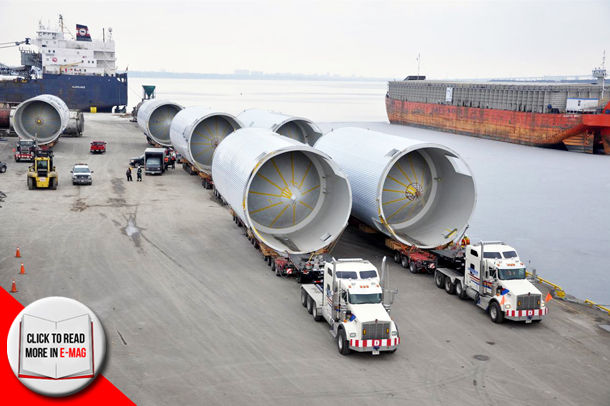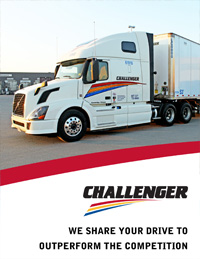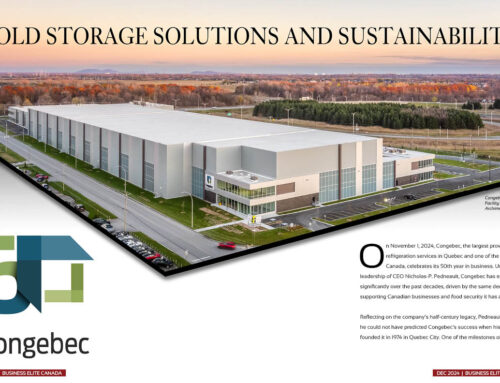We share your drive to outperform the competition
By Leah Kellar
Three pillars of business excellence have upheld Challenger Motor Freight’s consecutive 13-years on the list of Canada’s Best Managed Companies by Deloitte. For Challenger, excellence is about focusing on three pillars that form its foundation: meeting the needs of their own people, the needs of their customers, and keeping the business profitable.
“Being able to provide the services that your customers want and expect from you is one of the key ingredients to being successful. That is a differentiator in and of itself,” Jim Peeples, President and COO at Challenger Motor Freight.
The organization is not biased in any one of these pillars. Rather, for the past 39 years, their approach to business takes on a character of equal treatment in a win-win strategy that sustains itself to yield more than $300-million in annual revenue.
“Our belief is that if we look after our people, then they’ll be happy to work here and they’ll in turn focus on looking after our customers. They will create good business relationships with our customers as partners through which they become just as interested in our success as they are their own. That creates a never-ending cycle that supports itself,” said Peeples of the company’s award-winning management strategy.
Since its inception in 1975, Challenger has remained a national leader for the long haul. Like many of the most successful and enduring companies, Challenger is rooted in a humble beginning. Company founder, Dan Einwechter, owner, CEO and Chairman, started the business while attending university for business. He went to school during the day and drove a truck from Cambridge, Ontario across the U.S border into Ohio at night. He was able to grow the business from a single truck to a multi-truck fleet.
“Not everybody gets to have 1,500 trucks on the road and operate everywhere in North America,” said Peeples. “The folks that truly have a vision are the folks that survive.”
Challenger began as a full truckload carrier company and progressed steadily over the years to encompass a supply chain management organization. Initially, Challenger’s growth was largely thanks to clients in the automotive industry. 1985 marked a milestone year of change during which Challenger moved into its own facility and added some of the additional capabilities that it offers today. Six divisional services are organized under Challenger’s unique supply chain management system, and are offered independently for the client to choose from: full truckload (FTL), regional truckload, specialty climate control, specialty bulk and waste haulage, oversized and over-dimensional loads, logistics supply chain management. Logistics supply chain management utilizes an outsourcing strategy.
Challenger also provides the technology to manage customer transactions.
Selling the services independently in this manner was a deliberate decision on the part of the company to commoditize services in a bundled solution that is customizable to meet the unique needs of their clients. While this system of selling is not unheard of in the industry, it does set Challenger apart from many of its competitors in Canada. Creating this full-suite version of services coupled with ownership and management of its own fleet of trucks has differentiated Challenger from many large 3PL (3rd Party Logistics) providers. Peeples noted that many of these providers do not own assets such as trucks, trailers and warehouses.
“That creates a level of credibility for us that doesn’t exist with a company that has software only,” he said. “It creates a different level of conversation with the customers instead of just saying, ‘We have a truck that you can use.’ We weren’t the first to do this, but we’re certainly fast followers of what works and what’s needed,” said Peeples.
Peeples is relatively new to the trucking industry after joining the Challenger team a little more than a year ago and becoming president of the company in April. Peeples graduated university with a mechanical and industrial engineering degree. He then put his degree to work in the oil and gas sector and in pulp mills. But it was his 13-plus years of experience of working at both Michelin Tire—a manufacturer of truck tires and Purolator Courier—a transportation company, which provided him with much of the real-world experience required to manage a variety of business sectors.
Peeples has worn various managerial hats in operations including IT, environmental health and safety, real estate, airplane operations, engineering, quality, and working other positions around the world. Peeples credits his experience at Michelin, particularly the company’s multi-disciplinary approach to leadership, with his success in supply chain management. Quality management was his first choice at Michelin, but it was his boss at the time that convinced him to go into operations.
“He was right on all accounts. It was low risk for me at the time. I learned a lot, and I absolutely love it,” said Peeples.
Remarkably Challenger was one of the first to differentiate itself through a direct approach to sales marketing in the industry in Canada by sending potential customers a proposal letter, which introduced their cafeteria-style approach to selecting a wide variety of divisional services catering to the unique needs of customers.
“It basically said that we’ll look after everything in your supply chain that you do not want to do—whether it’s moving raw materials, ordering raw materials, taking finished goods out of your factory, storing finished goods, pick and pack, sequencing— from ocean to air to road, all those things we can do, from freight auditing to billing your customers if that’s what you want,” said Peeples.
Today, innovation at Challenger is a tradition of necessity and an ongoing process based on needs identified by customers and employees. Challenger is proud of its designation as a LEED (Leading Environmental and Engineering Design) certified facility. It is a designation, which verifies that a company has made a significant investment in various systems and processes that are environmentally safe and sustainable such as building construction, conservation of energy used for heating, lighting, water flow, waste disposal, and others.
“It was a conscious decision that the organization made several years ago when we invested in the facility. It automatically creates a space where people are concerned about being sustainable from an environmental perspective,” said Peeples.
Another certification that Challenger is very proud of is its recognition as a SmartWay partner. The SmartWay Program is a public-private initiative between EPA, large and small trucking companies, rail carriers, logistics companies, commercial manufacturers, retailers, and other federal and state agencies. It requires that companies invest in efficient solutions that reduce greenhouse carbon gas emissions and other harmful pollutants. Perforated mud flaps that allow airflow are an example of an innovation that Challenger has invested in and made a standard requirement on all truck tires to meet SmartWay accreditation. Others are SuperSingle tires, wind skirts, air-conditioning units, and aerodynamic truck design from the mirrors to cap to fenders.
Challenger has the latest fuel economy for its tractors and installed new software technology in its supply chain management. Satellite devices have been recently installed in all of its tractors for electronic logging of driver’s routes to accurately track hours of service. The company has also invested in auto-inflate technology systems in its trailers to reduce the number of breakdowns due to under-inflated tires. Staying current with investment in these necessary innovations is just part of the reason why Challenger has received the Best Managed Company recognition from Deloitte for an outstanding 13 years in a row.
“It talks about your strategy, financial benefit, sustainability, people involvement, etc. Basically we complete their standard, and answer their questionnaire as honestly and as completely as possible,” said Peeples.
“In the beginning the recognition was good for gaining business and promotion. Now after 13 years, it really hasn’t caused us to change significantly, but what it caused us to do is be a bit more introspective about the kind of things that we are doing.”
Challenger employees have contributed to more than 30 awards over the last 10 years, and the list goes on prior years. Many have been awarded for on-time service, fast service, and for being environmentally conscious in company practices and incorporating innovations. Challenger also makes donations of time, funding and transport services to a variety of charities with the local community and supported by its employees.
The three pillars of Challenger: its people, customers, and profit-building initiatives— have sustained its growth.
“This company has been in business for a long time and so as a result, you create a lot of business relationships. There’s not many industries or companies out there that haven’t heard of Challenger—certainly in Canada and lots of areas of the U.S,” said Peeples. “That wouldn’t be without the commitment of our people, and the loyal partnerships we have with our customers, and the businesses who support us.”







